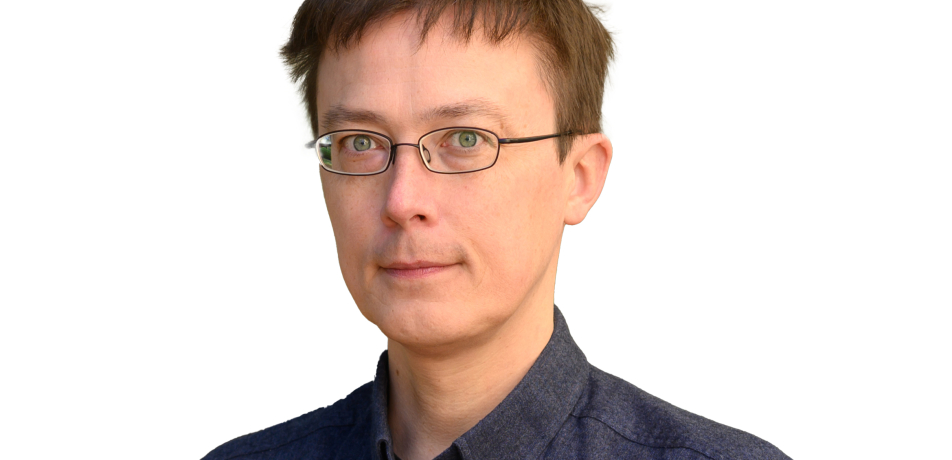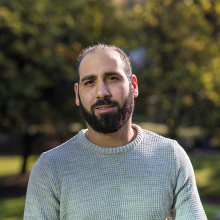Attracted to magnetism
Prof. Ilya Kuprov explores how magnetic resonance unlocks key insights across science and technology
New scientists

Prof. Ilya Kuprov, who joined the Department of Chemical and Biological Physics at the start of 2025, is on the cutting edge of exploring the fundamental physics of magnetism.
“We look at how magnetism comes to exist, why things become magnetic, and what to do with those properties,” he says. “Some elementary particles are tiny magnetic dipoles. When you put somebody into a magnet, those dipoles align, and it becomes possible to look inside the body, safely and conveniently, using magnetic resonance imaging.”
Beyond imaging, Prof Kuprov’s work on modelling and interpretation of magnetic phenomena has multiple applications in basic science. Some years ago, he was part of a team exploring the quantum mechanics of how a magnetosensitive chemical reaction in birds’ retinas helps them navigate, essentially serving as a biological compass. Early in his career, he also studied the quantum dynamics of magnetic states in photosynthetic reaction centers.
These days, however, he is fully dedicated to computational modeling. Magnetic resonance techniques are indispensable across disciplines, and as he explains, “Chemists use magnetic resonance spectroscopies to determine molecular structure; biologists use them for structural and kinetic studies—things like protein folds, DNA binding, pharmacology, toxicology. Even geologists analyze their rocks using magnetic resonance.”
Hit the ground running
Still, what would prompt a tenured professor of physics in the UK to move to Israel—in the middle of yet another war?
Prof. Kuprov points to what he sees as a “serious impending crisis” in British academia. After 22 years in Britain, first as a PhD student and postdoc at Oxford University and then as the Head of the Spin Dynamics Group at the University of Southampton, he grew increasingly frustrated with an academic environment burdened by overwhelming administration and teaching demands, bloated bureaucracy, and a corrosive focus on identity politics that undermine scientific investigation.
“Academic research at Weizmann Institute is in a much healthier state,” he says.
Over the years, he had spent around six months in Israel, including as a visiting professor at Weizmann. He was at the Institute in November 2023, a mere month after the October 7 attacks. “My friends at Weizmann asked me if I would like to postpone [the move], and I said, ‘I am applying for a professorship here. What would you think of me if I chickened out?’”
Prof. Kuprov’s ties with Weizmann Institute scientists go back a decade: he briefly worked with the late Prof. Shimon Vega, whom he calls “a pioneer and a leading light” in the field of magnetic resonance and has shared several research grants with his now-colleagues Profs. Lucio Frydman, Daniella Goldfarb, and David Tannor.
“I think the Weizmann Institute looks for people who fit in well before inviting them to apply. I already have some ideas for what to start working on with Lucio, David, and Daniella once I arrive, and some of that research is already underway. We’ll hit the ground running.”
A personal journey
Prof. Kuprov’s decision to move to Israel is also deeply personal. Raised in Siberia, Russia, when he told his parents he would be moving to Israel to start a new chapter of his career, his father, a geologist who worked in the fossil fuel exploration industry, and his mother, a mountaineering instructor, revealed a surprising family connection: his Ukrainian-born grandfather’s birth certificate listed him as Jewish. With that discovery, he was able to apply for repatriation on the grounds of Jewish ancestry, simplifying the move, which he describes as “easy and awesome.”
He is also enthusiastic about the “fantastic” resources at the Institute, lauding the excellent administrative support and reasonable teaching loads. Relocating to “the best place in a country is a lovely opportunity,” he says. “My experience at the Weizmann Institute has been delightful.”
Education and select awards
- BSc and MSc, Novosibirsk State University, Russia (2002)
- PhD, Corpus Christi College, University of Oxford (2005)
- Junior Research Fellow, Magdalen College, University of Oxford (2005-2009)
- Engineering and Physical Sciences Research Council Early Career Fellowship (2009); Research Fellowship at Wolfson College, University of Oxford (2010); Fellowship of the Royal Society of Chemistry (2015); Fellowship of the International Society of Magnetic Resonance (2021); and the Atreya Award from the National Magnetic Resonance Society of India (2022).
Appointments
- Assistant Professor, Oxford/University of Southampton (2009-2014)
- Associate Professor, then Full Professor, University of Southampton (2014-2024)








